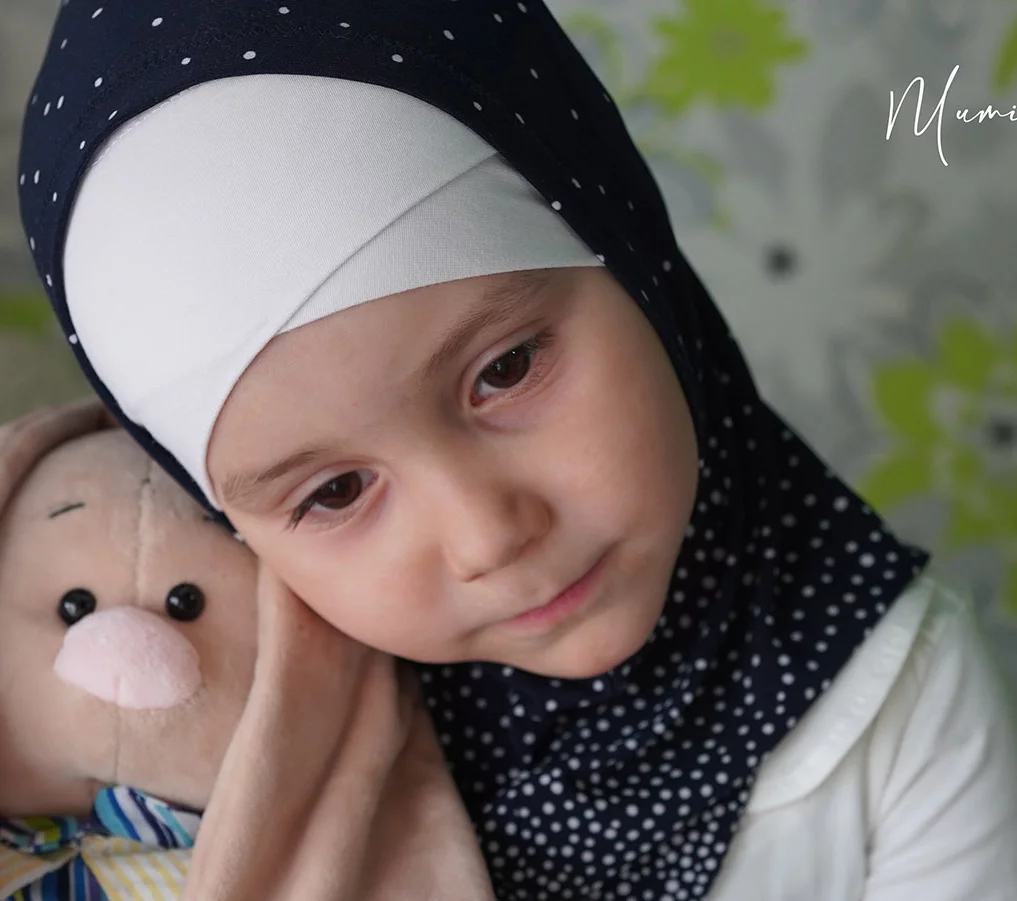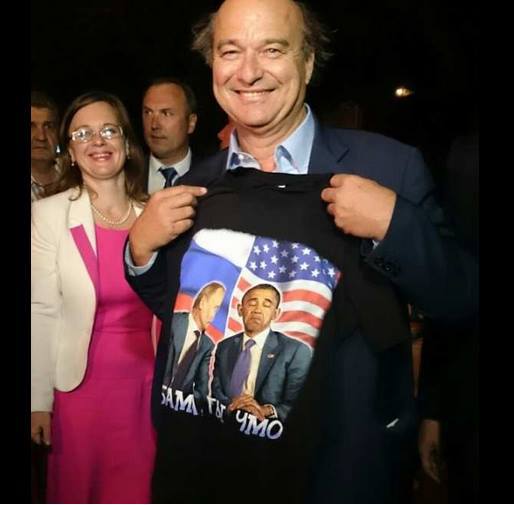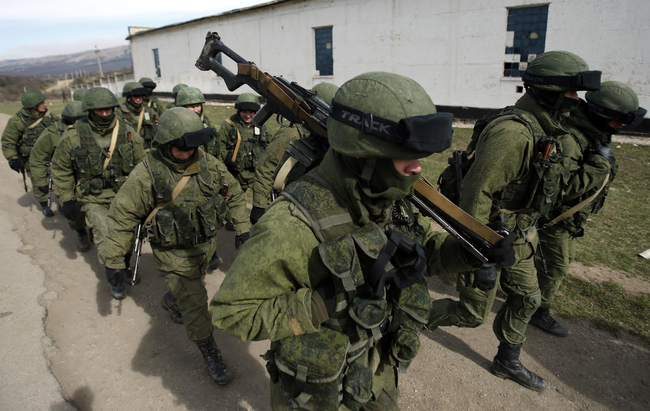On 22 August 2016, Ukraine’s General Prosecutors Office (GPO) released a video it says proves that top officials of the Russian Federation were involved in the illegal annexation of Crimea and stoking up separatist unrest in southeastern Ukraine in the aftermath of the Euromaidan Revolution.
The video contains phone intercepts of conversations in which Kremlin top advisor Sergey Glazyev discussed organizing Russia’s takeover of Crimea and pro-separatism rallies which eventually led to the outbreak of war on the territory of Ukraine. Curiously, it had been deleted from the GPO’s YouTube account but a copy is available on Censor.net. The video had been republished on the GPO’s channel the following day, with the explanation that it was removed due complaints about a copyright violation of the introductory music.
In a conversation dated 27 February 2014 (the day when the Crimean Parliament was seized, the Russian tricolor was raised, Aksyonov was appointed as the self-proclaimed governor, and a decision to hold a “referendum” was made) Russian President Vladimir Putins’s top advisor Glazyev advised Russian State Duma deputy Konstantin Zatulin, who was about to visit Crimea, to facilitate the inclusion of “needed” people to the self-proclaimed “government” of Crimea that would ensure the further occupation of peninsula.
In particular, Glazyev asked Zatulin to appoint “the street demonstrators” to executive positions in Crimea, who apparently didn’t trust Aksyonov and needed additional support “because they might disperse.”
In an intercept dated 6 March 2014, Glazyev informed the self-proclaimed “Prime Minister” of Crimea Sergey Aksyonov that the wording of the questions of the so-called “referendum” on seceding from Ukraine to be held ten days later “were problematic,” and that “we here are thinking how to formulate them so that people would understand them for sure.” According to Glazyev, many voters would not support the formulation “as part of Ukraine.” To this Aksyonov answered that five groups of Russians from different organizations who brought pre-made materials “approved by the State Duma from the viewpoint of it being able to adopt the relevant regulations.” The same day, Crimean officials announced that the questions for the “referendum” would include an option to join Russia, not just ensure greater autonomy from Ukraine.
Zatulin reported that they had “financed Odesa and Kharkiv” and collected requests from other regions, but placed them on hold because he had not yet “settled the financial issues,” and griped that the financial issues were becoming a burden, and that when he approached “that guy” (apparently responsible for finances), Zatulin was looked upon as if he was asking for money to build a third villa. Zatulin reported that he paid the Cossacks the money that 10 other people promised them and that he had orders for small sums waiting – 2-3 thousands of UAH. The future self-proclaimed “mayor” of Sevastopol Chalyi had requested a larger sum of 50,000 UAH. Glazyev promised to help sort out the issues.“We use power only to support the people, nothing more. And if there are no people, what support could there be?!”
According to journalist Andriy Lokhmatov, who witnessed the pro-separatism protests in Mykolayiv, their organization would not have been possible without the Russian organizers and money. The Kremlin had artificially stoked up the unrest that would lead to outbreak of war in Ukraine.
Read also: Meet the people behind Novorossiya’s grassroots defeat
“Why is Zaporizhzhia silent? We know that there are 1,500 people. Where are they? Where are the cossacks? I have an order to get everybody out on the streets, to demand Russia’s help against the ‘banderivtsi.’ Specially trained people need to knock out the ‘banderivtsi’ from the building [of the Oblast Council] and then to gather the Oblast Council and a create a body of the executive power.”
Glazyev instructs that people should be taken out on the streets like in Kharkiv, saying that “the President signed his order [on troop deployment in Ukraine], the operation is underway, we’re getting notified that the military is moving.”
He stressed that military intervention without a picture of “popular support” was impossible. “We use power only to support the people, nothing more. And if there are no people, what support could there be?!” – he stressed the Kremlin’s technique of hybrid war.
On 27 February 2014, Glazyev talked with Russian deputy Konstantin Zatulin about organizing pro-Russian coups in Odesa and Kharkiv. This is just a week after shooting of Euromaidan protesters and disgraced pro-Russian President Viktor Yanukovych’s exile from Ukraine.
Among the conversations, agreements for financial funding the project came up frequently. For example, on 27 February 2014, a certain Tamara called Glazyev on behalf of Yevhen Zhulin, the leader of the illegal armed band Oplot, to inform that she had sent him a cost bill. Glazyev assured her that his representatives will contact them regarding financing this separatist group in Kharkiv.
In a conversation dated 1 March 2014, Glazyev instructs Kirill, a citizen of the Russian Federation, to seize the Oblast Council in Odesa immediately in order to assemble the deputies to adopt a decision to “consider the authorities in Kyiv [the interim government acting after the Euromaidan’s victory – Ed.] to be illegitimate.” Kirill, in his turn, says that the deputies are afraid and do not convene. “That is the point,” Glazyev pushes. “You can’t go away. You need to take this Council, gather it together, make it adopt decisions.” Kirill counters that “a few people should fly in to receive particular instructions.” Glazyev answers: “ If you gather in a week, the ‘banderivtsi’ and police will be there already and will not let anybody in.”
You need to act decisively, Glazyev persuaded:
“The way that they did in Kharkiv and Donetsk. Our guys already took the local councils there. And here you need to do the same. To go into the local council and assemble the deputies. Don’t disperse, carry on. If you just assemble to talk and then go away, it will result in a defeat.”
In another conversation, a certain Denis from Odesa who together with others is ready to act “decisively” asks for instructions and reassurances from Glazyev. The latter assures him that he will be supported, and that it is important for people to appeal directly to Putin and Russia during the protests, with requests for protection. But it’s most important, Glazyev presses, that the local council be gathered “like in Kharkiv” and the deputies vote for the resolution to ask protection from Russia. “Who didn’t come and vote is a traitor, ‘banderite,’ fascist and so on, with all the ensuing consequences,” Glazyev instructs Denis in the methods with which the local deputies should adopt the decision the Kremlin needs.
The next day, a massive pro-Ukrainian march was held in Odesa, which turned deadly when a fire that started in the Trade Unions building took the lives of 42 people. Ukraine’s MFA would later say that it was this tragedy that proved that “Novorossiya” plan in Odesa was “doomed to fail.”
Taking into consideration the discovered evidence, the GPO launched a probe into 18 high-ranking officials of the Russian Federation, including Russian Defense Minister Sergei Shoigu and Russian presidential adviser Sergei Glazyev, on suspicion of committing crimes against the national security of Ukraine. According to the Prosecutor General Yuriy Lutsenko, the criminal charges were announced on August 8 with all 18 suspects wanted for “particularly grave crimes against Ukraine’s national and public security, peace and international order.” They all received the notifications by couriers or emails. However, the GPO site lists the names of 20 officials.
According to the General Prosecutors Office, as of 20 August 2016, the criminal actions of the representatives of the Russian authorities and heads of the Armed Forces of the Russian Federation caused the death of 2,263 and wounded at least 8,394 soldiers of the Armed Forces of Ukraine and other armed groups and caused material damage to Ukraine in amount UAH 1,3 trillion (USD 51,3bn).
Ukraine’s GPO says that the following Russian officials should be placed on an international wanted list.
The list of the citizens of the Russian Federation against which criminal proceedings have been initiated:
- Advisor of the President of the Russian Federation Glazyev Sergei
- Ex Plenipotentiary of the President of the Russian Federation in the former “Crimea Federal District” Oleg Belaventsev
- Minister of Defense of the Russian Federation, General Sergei Shoigu
- Deputy Head of the Ministry of Defense of the Russian Federation, General Dmitriy Bulgakov
- Deputy Head of the Ministry of Defense of the Russian Federation, General Nikolay Pankov
- Head of the General Staff of the Armed Forces of the Russian Federation – the first Deputy Minister of Defense of the Russian Federation, General Valeriy Gerasimov
- First Deputy Head of the General Staff of the Armed Forces of the Russian Federation, Lieutenant-General Nikolay Bohdanovskiy
- Deputy Head of the Southern Military District of the Armed Forces of the Russian Federation, Lieutenant-General Igor Turchenyuk
- Deputy head of the Commander in Chief of the Navy of the Russian Federation, Vice Admiral Aleksandr Fedotenkov
- Commander of the Black Sea Fleet of the Russian Federation Aleksandr Vitko
- First Deputy Head of the Commander of the Black Sea Fleet of the Russian Federation, Vice Admiral Aleksandr Nosatov
- Deputy Commander of the Coastal Defense Troops of the Russian Federation, General Major Aleksandr Ostrikov
- Head of the Department of the Combat Training of the Black Sea Fleet, Captain 1st Rank Aleksandr Chesnokov
- Deputy Commander of the 810th Marine Brigade of the Russian Federation, Lieutenant Colonel Vladymyr Karpushenko
- Commander of the 41st Missile Ship Brigade of the Russian Federation, Captain 1st Rank Aleksandr Tolmachov
- Commander of the 20th Army of the Western Military District of the Armed Forces of the Russian Federation, General Major Segey Kuzovlev
- Commander of the 200th Pechenga Separate Motorized Riffle Brigade of the Armed Forces of the Russian Federation, General Major Oleg Tsekov
- Commander of the 34th Separate Motorized Riffle Brigade of the Armed Forces of the Russian Federation, General Major Mykhail Zusko
- Deputy Commander of the 58th Army of the Southern Military District of the Armed Forces of the Russian Federation, General Major Eugeniy Nikiforov
- Commander of the of the 58th Army of the Southern Military District of the Armed Forces of the Russian Federation, General Lieutenant Andrey Gurulyov
Related:
- Chronology of the annexation of Crimea
- Meet the people behind Novorossiya’s grassroots defeat
- Timeline of events in Odesa on May 2, 2014
- Ukrainian military intelligence identifies top Putin’s generals conducting war in Ukraine
- Russian military analyst: The forces in Donbas are Russian Army
- Soloshenko: What imprisoned Russian army officers told me…








